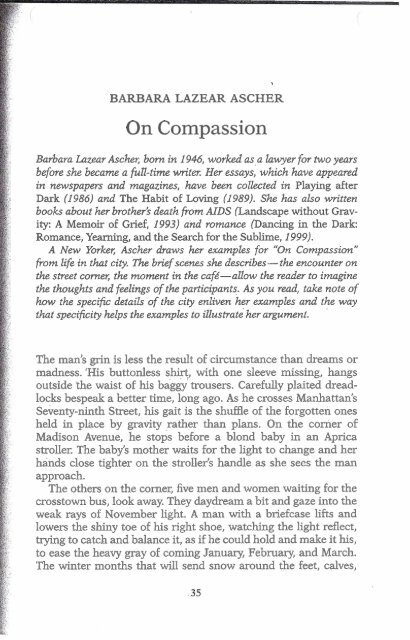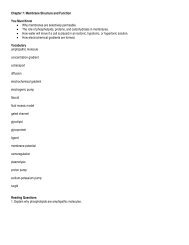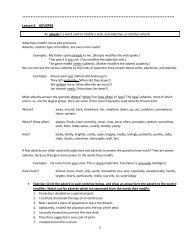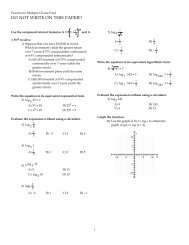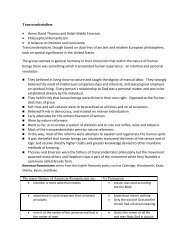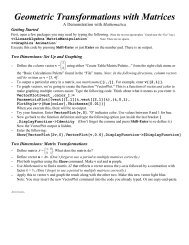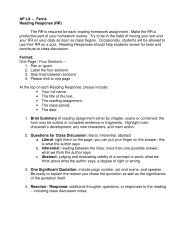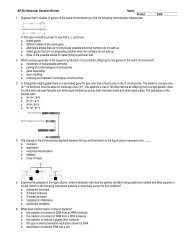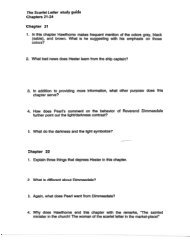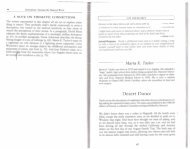"On Compassion" by Barbara Lazear Ascher - Hartland High School
"On Compassion" by Barbara Lazear Ascher - Hartland High School
"On Compassion" by Barbara Lazear Ascher - Hartland High School
Create successful ePaper yourself
Turn your PDF publications into a flip-book with our unique Google optimized e-Paper software.
,<br />
BARBARA LAZEAR ASCHER<br />
<strong>On</strong> Compassion<br />
<strong>Barbara</strong> <strong>Lazear</strong> <strong>Ascher</strong>, born in 1946, worked as a lawyer for two years<br />
before she became a full-time writer. Her essays, which have appeared<br />
in newspapers and magazines, have been collected in Playing after<br />
Dark (1986) and The Habit of Loving (1989). She has also written<br />
books about her brother's death fi-om AIDS (Landscape without Grav-<br />
ity: A Memoir of Grief, 1993) and romance (Dancing in the Dark:<br />
Romance, Yearning, and the Search for the Sublime, 1999).<br />
A New Yorkev, <strong>Ascher</strong> draws her examples for "<strong>On</strong> Compassion"<br />
Ffom life in that city. The briefscenes she describes- the encounter on<br />
the street corner, the moment in the cafd-allow the reader to imagine<br />
the thoughts and feelings of the participants. As you read, take note of<br />
how the specific details of the city enliven her examples and the way<br />
that specificity helps the examples to illustrate her argument.<br />
The man's grin is less the result of circumstance than dreams or<br />
madness. 'His buttonless shirt, with one sleeve missing, hangs<br />
outside the waist of his baggy trousers. Carefully plaited dread-<br />
locks bespeak a better time, long ago. As he crosses Manhattan's<br />
Seventy-ninth Street, his gait is the shuffle of the forgotten ones<br />
held in place <strong>by</strong> gravity rather than plans. <strong>On</strong> the corner of<br />
Madison Avenue, he stops before a blond ba<strong>by</strong> in an Aprica<br />
stroller. The ba<strong>by</strong>'s mother waits for the light to change and her<br />
hands close tighter on the stroller's handle as she sees the man<br />
approach.<br />
The others on the corner, five men and women waiting for the<br />
crosstown bus, look away. They daydream a bit and gaze into the<br />
weak rays of November light. A man with a briefcase lifts and<br />
lowers the shiny toe of his right shoe, watching the light reflect,<br />
trying to catch and balance it, as if he could hold and make it his,<br />
to ease the heavy gray of coming January, February, and March.<br />
The winter months that will send snow around the feet, calves,
and knees of the grinning man as he heads for the shelter of<br />
Grand Central or Pennsylvania Station.<br />
But for now, in this last gasp of autumn warmth, he is still. His<br />
eyes fix on the ba<strong>by</strong>. The mother removes her purse from her<br />
shoulder and rummages through its contents: lipstick, a lace<br />
handkerchief, an address book. She finds what she's looking for<br />
and passes a folded dollar over her child's head to the man who<br />
stands and stares even though the light has changed and traffic<br />
navigates about his hips.<br />
His hands continue to dangle at his sides. He does not know<br />
his part. He does not know that acceptance of the gift and gratitude<br />
are what make this transaction complete. The ba<strong>by</strong>, weary of<br />
the unwavering stare, pulls its blanket over its head. The man<br />
does not look away. Like a bridegroom waiting at the altar, his<br />
eyes pierce the white veil.<br />
The mother grows impatient and pushes the stroller before her, 5<br />
bearing the dollar like a cross. Finally, a black hand rises and<br />
closes around green.<br />
Was it fear or compassion that motivated the gift?<br />
Up the avenue, at Ninety-first Street, there is a small French<br />
bread shop where you can sit and eat a buttery, overpriced croissant<br />
and wash it down with rich cappuccino. Nce when I have<br />
stopped here to stave hunger or stay the cold, twice as I have sat<br />
and read and felt the warm rush of hot coffee and milk, an old<br />
man has wandered in and stood inside the entrance. Hc-wears a<br />
stained blanket pulled up to his-chin, and a woolen hood pulled<br />
down to his gray, bushy eyebrows. As he stands, the scent of stale<br />
cigarettes and urine a s the small, overheated room.<br />
The owner of the shop, a moody French woman, emerges from<br />
the kitchen with steaming coffee in a Styrofoam cup, and a small<br />
paper bag of. . . of what? Yesterday's bread? Today's croissant?<br />
He accepts the offering as silently as he came, and isgone.<br />
Wce I have witnessed this, and twice I have wondered, what<br />
compels this woman to feed this man? Pity? Care? Compassion?<br />
Or does she simply want to rid her shop of his troublesome presence?<br />
If expulsion were her motivation she would not reward his<br />
arrival with gifts of food. Most proprietors do not. They chase the<br />
homeless from their midst with expletives and threats.<br />
As winter approaches, the mayor of New York City is moving lo<br />
the homeless off the streets' and into Bellevue Hospital. The New<br />
York Civil Liberties Union is watchful. They question whether the<br />
ON COMPASSION - 37<br />
rights of these people who live in our parks and doorways are<br />
being violated <strong>by</strong> involuntary hospitalization.<br />
I think the mayor's notion is humane, but I fear it is something<br />
else as well. Raw humanity offends our sensibilities. We want to<br />
protect ourselves from an awareness of rags with voices that<br />
make no sense and scream forth in inarticulate rage. We do not<br />
wish to be reminded of the tentative state of our own well-being<br />
and sanity. And so, the troublesome presence is removed from the<br />
awareness of the electorate.<br />
Like other cities, there is much about Manhattan now that<br />
resembles Dickensian London. Ladies in high-heeled shoes pick<br />
their way through poverty and madness. You hear more cocktail<br />
party complaints than usual, "I just can't take New York any-<br />
more." Our citizens dream of the open spaces of Wyoming, the<br />
manicured exclusivity of Hobe Sound.<br />
And yet, it may be that these are the conditions that finally give<br />
birth to empathy, the mother of compassion. We cannot deny the<br />
existence of the helpless as their presence grows. It is impossible<br />
to insulate ourselves against what is at our very doorstep. I don't<br />
believe that one is born compassionate. Compassion is not a<br />
character trait like a sunny disposition. It must be learned, and it<br />
is learned <strong>by</strong> having adversity at our windows, coming through<br />
the gates of our yards, the walls of our towns, adversity that<br />
becomes so familiar that we begin to identify and empathize<br />
with it.<br />
For the ancient Greeks, drama taught and reinforced compas-<br />
sion within a society, The object of Greek tragedy was to inspire<br />
empathy in the audience so that the common response to the<br />
hero's fall was: "There, but for the grace of God, go I." Could it be<br />
that this was the response of the mother who offered the dollar,<br />
the French woman who gave the food? Could it be that the home-<br />
less, like those ancients, are reminding us of our common hu-<br />
manity? Of course, there is a difference. This play doesn't end-<br />
and the players can't go home.<br />
For Discussion and Writing<br />
1. What examples of encounters with the homeless does <strong>Ascher</strong> offer?<br />
2. Imagine and list alternative examples of encounters with the home- ,<br />
less that <strong>Ascher</strong> might have used. How might they have changed her<br />
I essay?


